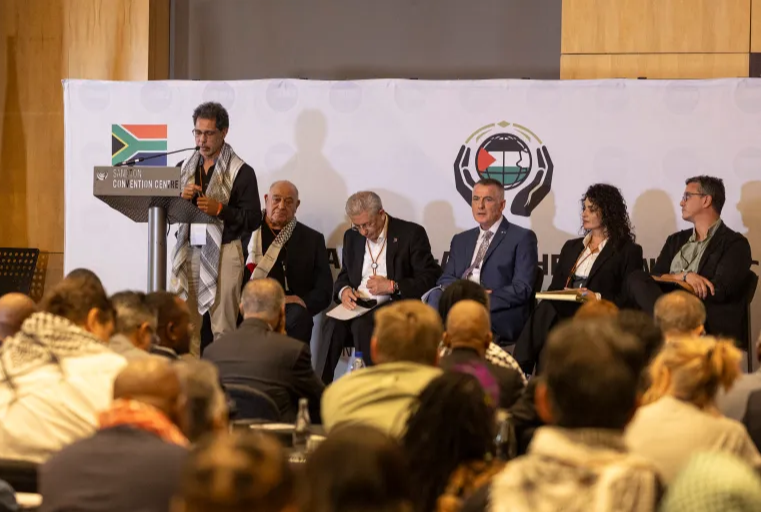
Deputy Chair of the History Workshop and is Senior Lecturer in the History Department at the University of the Witwatersrand, Noor Nieftagodien (L), addresses attendees during the first Global Anti Apartheid Conference on Palestine in Sandton near Johannesburg on May 10th.
The first Global Anti Apartheid Conference on Palestine took place in Sandton near Johannesburg on Friday [Emmanuel Croset/AFP]
Johannesburg, May 11 (RHC)-- A leading Palestinian human rights lawyer has said it won’t be the courts that liberate Palestine but the resilience of its people resisting Israeli occupation.
“The International Court of Justice (ICJ) is not going to liberate Palestine. The International Criminal Court (ICC) is not going to liberate Palestine. The resilience of Palestinian people standing on the ground paying with blood, pain and starvation. Those resisting will liberate Palestine,’’ Palestinian lawyer Raji Sourani said in his address at the Global Anti-Apartheid Conference for Palestine being held in Johannesburg, South Africa.
“We will never give up. We will never lose the hope, we are on the right side of history. We know genuinely we are defending a just, fair and right cause,” Sourani said. “We are not alone. We are much stronger with the committed people across the globe.”
Zane Dangor, director-general of South Africa’s foreign ministry, said several strategies, including the legal route, lobbying and mass mobilisation need to be synergised for the freedom of Palestine.
Speaking of the struggle against apartheid in South Africa, Dangor said that by the 1980s they felt it was time for a change, and similarly it seemed the time for Palestinian freedom was now. “This is Palestine’s South Africa moment, let’s seize it, let’s make sure we mobilise with all the tools we have available,’’ he said.
On Friday, South Africa asked the ICJ to order Israel to withdraw from Rafah, the southern Gaza city where more than a million Palestinians have taken shelter, as part of additional emergency measures over the war.
Sami al-Arian, director of the Center for Islam and Global Affairs at Istanbul Zaim University, says the way the international community dealt with apartheid South Africa could serve as a guide for UN member states going forward.
“The United Nations and many countries around the world imposed sanctions and all kinds of economic penalties on South Africa, eventually even kicking out South Africa from the General Assembly,” he told Al Jazeera. “I think they can try that path as well because Israel has been defying their will for the longest time,” he added.
Al-Arian noted that hundreds of resolutions have been passed by the UN over the years but “none of them have been implemented in any meaningful way” by Israel, adding that the US “has been protecting Israel’s atrocities during this whole time with impunity, basically.” Al-Arian also called the stance of some Arab countries “quite shameful.”
“Some of the Arab states are basically complicit in these crimes, even without saying it, and some of them are just impotent. But we have to remind ourselves there’s a lot of cards that they can play, they have a lot of leverage,” he said, citing their massive investment in the US economy, their hosting of U.S. bases and the selling of oil in U.S. dollars which effectively makes the U.S. dollar the reserve currency in the world.
“There are so many cards that they can play; they can withdraw their ambassadors, they can do all kinds of things but unfortunately there’s no will within the Arab political order to use any of it.”

